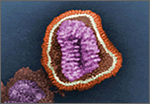|
|
|
|
 |
 |
 > Recommendations > Differences Between Flu and a Cold > Vaccination dimarts, 13 de gener de 2009
The flu is an acute, infectious and contagious illness caused by a virus. The risk of catching it is greatest in winter, the coldest season of the year. Last week, for example, the Government of Catalonia (Generalitat) announced there was a flu epidemic, with 140 cases per 100,000 people.
The onset of flu is sudden and the most common symptoms include high fever, chills, headache, a sore throat, tiredness, aching muscles, a dry cough and a blocked nose. These symptoms, which may be accompanied by diarrhoea and vomiting, especially amongst children, do not disappear from one day to the next. Fever caused by flu lasts four or five days and the tiredness and cough can go on for up to three weeks. Generally speaking, it takes a week or two to recover from flu. However, flu in older people, or those with chronic illnesses, can cause complications, mainly of a respiratory nature (pneumonia and bronchitis).
Recommendations
+ Drinking plenty of fluids is recommended to a flu patient.
There is no specific treatment for flu and there is no medicine that can cure it. However, doctors make a series of recommendations in order to alleviate the symptoms: rest, drink plenty of fluids (water, juice, broth, herbal tea), do not smoke or drink alcohol, etc. Medicines such as paracetamol help lower fever and lessen pain, but it is not advisable to take antibiotics. The reason for this is simple: antibiotics attack bacteria, not viruses.
Differences Between Flu and a Cold
+ Flu and colds share certain symptoms.
It is helpful not to confuse flu with a cold, which is also a viral infection, although with less severe symptoms. We mention this because flu and colds share certain symptoms, such as a sore throat, cough and a blocked nose. However, colds appear more slowly and recovery is quicker. Muscular pain is less intense, as is tiredness, and the fever is not as high - body temperature does not usually go any higher than 38 °C.
Vaccination
+ The flu virus changes from one year to the next.
There is no vaccine against catching a cold, but there is one against the flu. The flu vaccine is recommended for specific groups, such as people aged 60 and over, those with chronic illnesses, small children (aged six months and above) and adolescents undergoing a prolonged treatment with acetylsalicylic acid (aspirin), and women who are more than three months pregnant. The vaccine is given annually, preferably in October or November. This is because the flu virus is very good at mutating, meaning it changes from one year to the next.
|
Investiga

> Grip i refredat: diferències i coincidències.

> La grip del 1918, o grip espanyola, mare de totes les pandèmies.

> La grip del 1918, als Estats Units.
I també...
- Curiositats sobre la grip.
- Que t'has de vaccinar?
- Preguntes i respostes sobre la grip.
- Anecdotari del refredat.
Portada |
Europa Press |
El Punt |
La premsa |
Especials |
Diari de l'escola |
LesFinances.info |
Editorials |
Mail obert |
Els blocs |
Lletres
Tecnologia i ciència | Solidaritat | Cap de 7mana | Campus | El 9 | Presència | Fòrums | Enquestes | Xat | Correu
Traductor | Edicions en Pdf | Wap-pda | Biblioteca | Lletra més grossa
Tecnologia i ciència | Solidaritat | Cap de 7mana | Campus | El 9 | Presència | Fòrums | Enquestes | Xat | Correu
Traductor | Edicions en Pdf | Wap-pda | Biblioteca | Lletra més grossa
| Què és VilaWeb? Publicitat Mapa web Contacte | Una web de Partal, Maresma i Associats, S.L. |


